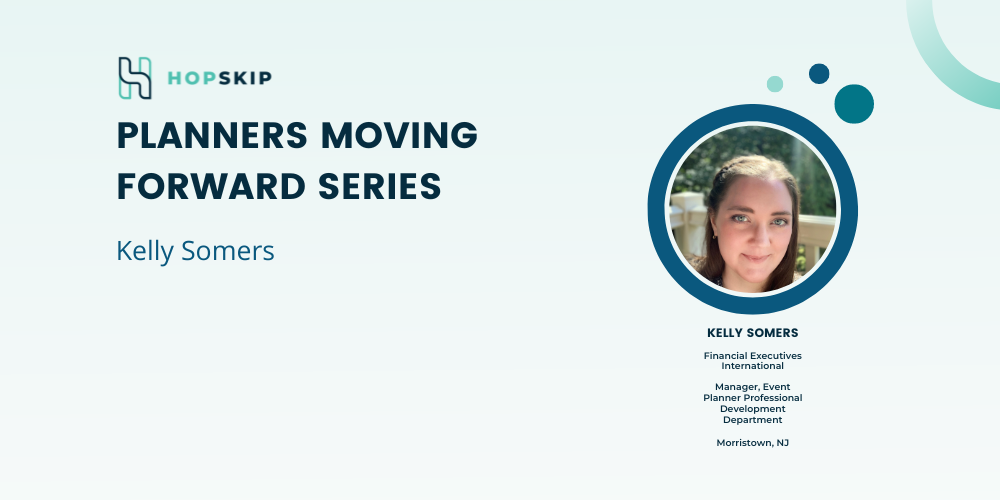This post is part of the HopSkip Planner Spotlight Series where HopSkip spotlight's planners across the industry to bring awareness of how they adapted to COVID-19, communicating and lessons learned and sharing how they are viewing the meetings and events industry in a post-pandemic world.
Name: Kelly Somers
Company Name: Financial Executives International
Job Title: Manager, Event Planner Professional Development Department
Years of Experience: 7
How do you think you are positioned, after months of persevering with the pandemic, to take advantage of our new and disrupted meetings/events landscape?
The pandemic made it necessary for everyone to be agile in everything they did. Everything changed and we all had to change with it. What I try to always keep in mind is the attendee experience. That is the main objective. I take that and work backwards to achieve that goal. Sometimes, I need to be the voice of reason and explain why something won't work logistically or I jump in with three or four back up plans. This is especially critical now that we are exploring the hybrid world. It is important now to have experience in a multitude of areas. My team looks to me to solve onsite and a host of virtual issues. It's a matter of continuing to learn and grow in the new fields. By doing so, you help your company and in turn, your attendees.
As our community moves forward with planning in-person meetings, what new technologies or processes are you implementing that you may have not looked at before?
My company is completely remote since the pandemic. It has made planning... interesting. With in person meeting starting up again, we are relying heavily on project planning software like asana. Also, we are incorporating virtual aspects to our conferences to make the meetings hybrid. This is tricky because its basically planning two separate meeting. This involves contracting both a virtual vendor and an onsite vendor for badging etc. Plus all the onsite vendors like the decorates. The trick has been staying organized and pulling them all together to make it a cohesive conference or meeting.
As we see virtual meetings transition back to face to face, hybrid meetings are beginning to be the vehicle to return to normalcy. What are your thoughts on hybrid meetings versus traditional fully in-person meetings?
I do feel like hybrid meetings are here to stay especially as the winter comes and people are less likely to travel. However, there is something lost with attendees on a screen versus in the room. I think we should put the experience of the attendee on site's experience as a priority. They are the ones who made the travel arranges, booked the hotel, are on site. I understand it is not possible for everyone to do so but I don't think their experience should be impacted to appease virtual attendees who can login from anywhere. If anything, the virtual attendees should be more like a "fly on the wall" and simple watch. Or sessions can be recorded and watched later. However, it is done, I do not see the virtual aspect leaving meetings any time soon. It is too easy and too much a part of the culture now. Even down to speakers canceling last minute and assuming they can Zoom into a meeting. As planners, we need to be prepared for these changes.
In your opinion, what do you think the biggest value for your attendees is in regards to returning to live events?
It is definitely networking. People want to talk to each other face to face. Chat over dinner and not sit in front of their computers. Something is missing virtually and the live events is bringing that back.
As the pandemic fades away and we return to face-to-face events what do you hope changes, either for planners or hoteliers, in the traditional RFP and proposal process as a result of all of the learnings from the last 20+ months?
I hope there is greater flexibility in room pacing. I am seeing later and later reservation blocking and the hotels are becoming more rigid with the blocks. I think a little more understanding while we all learn our new pacing structure would be greatly appreciated.
This post is part of the HopSkip Planner Spotlight Series where HopSkip spotlight's planners across the industry to bring awareness of how they adapted to COVID-19, communicating and lessons learned and sharing how they are viewing the meetings and events industry in a post-pandemic world.
